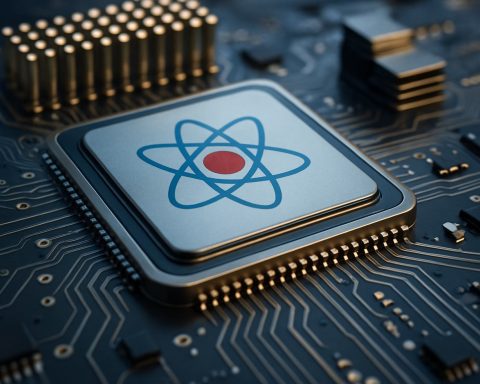- Nokia bought back over 1.2 million shares at an average price of €4.52 each, totaling nearly €5.5 million.
- The buyback program aims to counteract share dilution from the Infinera Corporation acquisition.
- Nokia plans to repurchase up to 150 million shares with an investment of up to €900 million by December 2025.
- The initiative aligns with strict EU regulations, emphasizing Nokia’s commitment to transparency.
- After the buyback, Nokia holds 238 million treasury shares, showcasing its strong market position.
- This strategy reflects Nokia’s focus on enhancing shareholder value and long-term sustainable growth.
On February 4, 2025, Nokia Corporation made headlines with a bold move in the stock market, buying back over 1.2 million shares at an impressive average price of €4.52 each. This strategic repurchase, amounting to nearly €5.5 million, is part of Nokia’s ongoing initiative to reclaim control over its stock and enhance shareholder value.
In late November 2024, Nokia unveiled its ambitious share buyback program, a response to the dilution effects caused by issuing new shares related to its acquisition of Infinera Corporation. With plans to repurchase up to 150 million shares, the company aims for a total investment of up to €900 million by the end of December 2025. This effort aims to solidify investor confidence and counterbalance the challenges posed by new share issuances.
The share buyback is set within a framework of compliance with strict EU regulations, highlighting Nokia’s commitment to transparency and responsible financial practices. Following this transaction, the tech giant holds a substantial 238 million treasury shares in reserve, indicating a strong position in the market.
As Nokia continues to innovate in the technology sector, particularly through its pioneering work in networks, this bold move signals to investors that the company is not only financially robust but also focused on long-term growth and stability.
In conclusion, Nokia’s proactive approach to share buybacks can be seen as a resounding message to the market: investors should invest confidently as Nokia gears up for a promising future.
Is Nokia’s Bold $900 Million Share Buyback Strategy a Game Changer?
Overview of Nokia’s Share Buyback Strategy
On February 4, 2025, Nokia Corporation made headlines with a significant stock market move, repurchasing over 1.2 million shares at an average price of €4.52 each, totaling approximately €5.5 million. This initiative is part of a broader strategy that began in late November 2024, when Nokia announced a €900 million share buyback program intending to repurchase up to 150 million shares by December 2025. This is aimed at mitigating the dilution effects from issuing new shares for the acquisition of Infinera Corporation and enhancing overall shareholder value.
Market Forecasts and Trends
– Market Predictions: Analysts predict that if Nokia successfully completes its share buyback program, this could lead to an increase in share price as the reduction in outstanding shares typically leads to higher Earnings Per Share (EPS). The move is also expected to bolster investor confidence, which can attract more institutional investments.
– Trends in Tech Sector: The technology sector has seen a rise in share buyback programs as companies aim to return value to shareholders, countering market uncertainty and volatility. With other tech giants also partaking in similar initiatives, Nokia’s proactive strategy places it among competitors like Apple and Microsoft, who have executed robust buyback programs in recent years.
Pros and Cons of Nokia’s Strategy
– Pros:
– Enhances shareholder value by reducing the number of outstanding shares.
– Signals to the market that the company is confident in its future prospects.
– Provides flexibility in managing its treasury shares, which can be used for employee compensation plans or future acquisitions.
– Cons:
– High cash outflow, which may impact liquidity.
– Could be seen as a short-term tactic to boost share prices rather than focusing on long-term growth strategies.
– Depends heavily on the performance of the stock post-buyback to realize benefits.
Important Questions
1. How does Nokia’s share buyback program compare to others in the tech industry?
– Nokia’s initiative is similar to other major buybacks in the tech sector, notably those by Apple and Microsoft, both of which returned significant capital to shareholders through buybacks. Nokia’s case stands out given the context of its acquisition-related share dilution. Analysts liken its long-term focus with those successful tech giants, suggesting that it could attract more interest if completed efficiently.
2. What are the implications of Nokia holding 238 million treasury shares?
– Holding a substantial amount of treasury shares allows Nokia to execute various strategies, including funding future acquisitions, implementing employee stock plans, or simply holding for price appreciation. It provides Nokia with flexibility in capital allocation discussions with creditors and stakeholders. The maintenance of these shares also positions the company favorably against its competitors in leveraging corporate maneuvers.
3. What are the broader implications of this buyback for Nokia’s stock performance in the next couple of years?
– If the buyback is executed effectively and local and global markets remain stable, Nokia’s stock performance is likely to improve due to a tighter share supply and potentially increased investor confidence, which could lead to institutional buying. Furthermore, if Nokia continues its innovation in tech, particularly in networks, this can drive profitability and long-term growth.
For more detailed insights on Nokia, check their corporate news at nokia.com.














